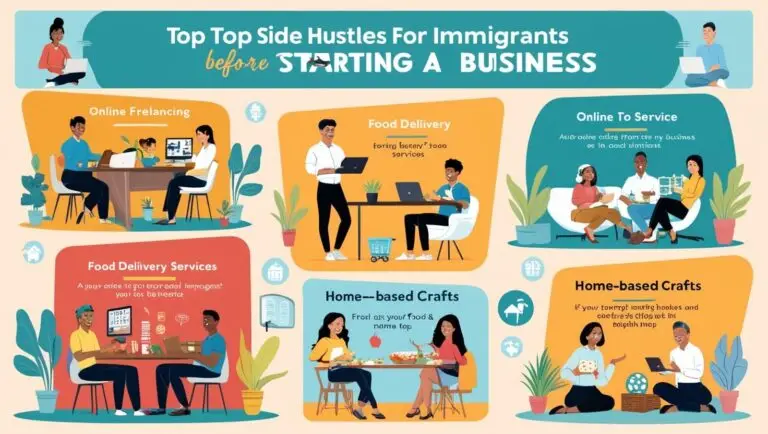For many immigrants, the journey to entrepreneurship begins with overcoming fear—fear of the unknown, cultural barriers, discrimination, or financial risk. Yet, history is rich with stories of immigrants who’ve built thriving businesses, contributing to their communities and economies while carving out their version of success. This guide explores how immigrants transform challenges into opportunities, offering actionable tips and inspiration for aspiring business owners.
Why Fear is Common Among Immigrant Entrepreneurs
Challenges That Fuel Fear
- Cultural and Language Barriers: Immigrants often navigate business environments with different norms, languages, and legal systems.
- Lack of Financial Access: Limited credit history in the new country often restricts access to capital, making startups harder to fund.
- Fear of Discrimination: Bias based on race, nationality, or accents can discourage immigrants from pursuing opportunities.
- Uncertainty About Legal Systems: Understanding immigration laws and business regulations can feel overwhelming for newcomers.
Turning Fear into Motivation
For many immigrants, fear drives resilience and creativity. The experience of starting fresh often fosters resourcefulness and a willingness to take calculated risks.
Steps to Turn Fear into Fortune
1. Start Small and Build Gradually
- Begin with a side hustle or freelance work to test your idea without significant financial risk.
- Example: Many immigrant entrepreneurs, like Hamdi Ulukaya, founder of Chobani, started small by identifying gaps in the market and scaling gradually.
2. Learn the Business Landscape
- Take the time to understand local business laws, tax systems, and market dynamics.
- Attend workshops, seek out business mentorship programs, and connect with local chambers of commerce.
3. Secure Funding Through Nontraditional Means
- Look into microloans, crowdfunding, and grants designed for minority or immigrant entrepreneurs.
- Example: In Canada, programs like the Start-Up Visa or CDFI loans in the U.S. specifically support immigrants in starting businesses.
4. Embrace Networking and Community Support
- Engage with immigrant-focused organizations or cultural communities for mentorship and collaboration.
- Example: Organizations like the Immigrant Entrepreneur Development Program in Australia offer tailored resources for immigrant entrepreneurs.
5. Celebrate Cultural Identity
- Use your heritage as an asset. Incorporate elements of your culture into your business model to differentiate your product or service.
- Example: Fatima’s fashion business in the U.S. fused West African textiles with modern design, gaining recognition and financial success.
Inspiring Stories of Immigrant Entrepreneurs
1. Hamdi Ulukaya (Turkey to the U.S.)
- Business: Chobani Yogurt
- Journey: Hamdi arrived in the U.S. with minimal resources. He took a risk by buying an abandoned yogurt plant, transforming it into the leading Greek yogurt brand. His commitment to employing refugees showcases the power of inclusive entrepreneurship.
2. Ajay Banga (India to the U.S.)
- Business: Former CEO of Mastercard
- Journey: Ajay climbed the corporate ladder by integrating his Indian heritage into his leadership style, eventually transforming Mastercard into a global powerhouse.
3. Seun Richards (Nigeria to Canada)
- Business: Door2Door Pickup Couriers
- Journey: Seun started with a microloan to launch a logistics company serving underserved areas. His business grew rapidly during the COVID-19 pandemic.
4. Kanya King (Ghana to the UK)
- Business: MOBO Awards
- Journey: Facing discrimination in the UK’s music industry, Kanya founded the MOBO Awards to celebrate Black and multicultural talent, creating a global cultural institution.
Overcoming Barriers with Strategic Resources
1. Programs for Immigrant Entrepreneurs
- U.S.: Minority Business Development Agency (MBDA), SBA’s Microloan Program.
- Canada: Start-Up Visa, Provincial Nominee Programs.
- UK: Innovator Founder Visa, Prince’s Trust Enterprise Program.
- Australia: Business Innovation and Investment Program (BIIP).
2. Mentorship and Networking Platforms
- Join global networks like the International Entrepreneurs Association or Startup Grind.
Conclusion
The path from fear to fortune is filled with obstacles, but immigrants have consistently proven their ability to overcome adversity and create successful businesses. By leveraging community resources, embracing their cultural identities, and taking calculated risks, immigrant entrepreneurs can transform their fears into stepping stones for success.
Would you like suggestions for keywords, related topics, or tailored strategies for this article?






